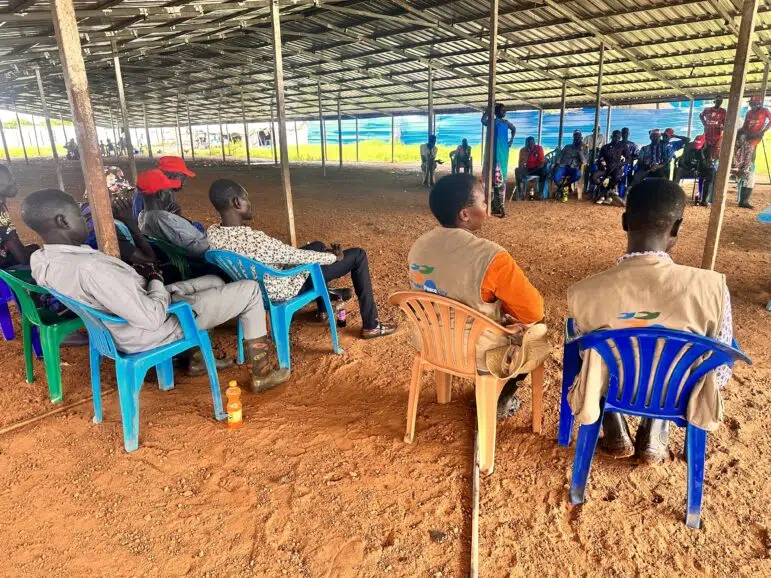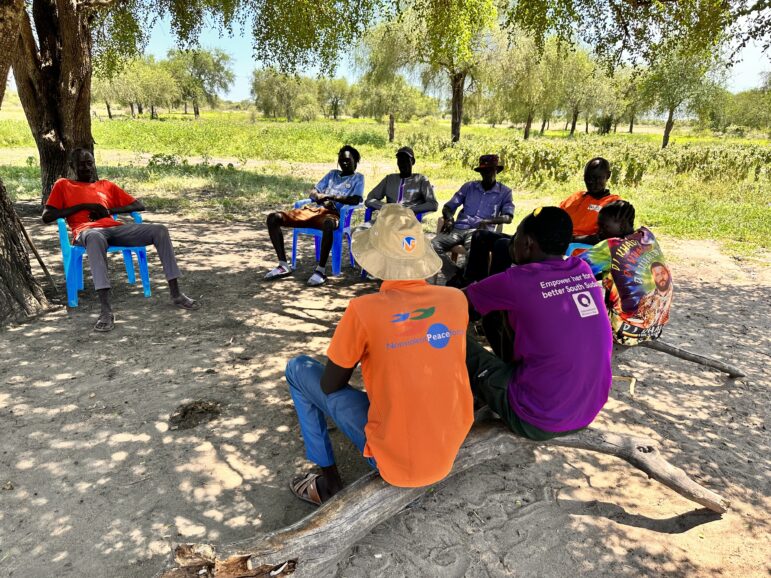Empowering Youth and Strengthening Protection in Pibor
Civilians of the Murle community in the Greater Pibor Administrative Area (GPAA) of South Sudan have a cultural practice of dividing into peer groups along their generations. These groups are commonly referred to as ‘age sets’.
Over the past several years, conflict between individuals from differing age sets has escalated into broad conflict between age groups – placing the entire community at risk of violence. In NP's experience of working with youth, direct engagement has been the best strategy in deterring violence. This strategy is effective because it empowers young people to make positive impacts on their communities, often through peacebuilding and protection efforts.
NP currently supports 30 Youth Protection Team members (YPTs) which is made up of leaders from different age sets on one team. The formation of the team has led to a significant reduction of violence between age groups and increased the frequency and space for dialogue between group leaders. YPTs have established Early Warning, Early Response committees in Lekuangole, Gumuruk, and Pibor counties of GPAA, which involve representatives from all the age sets across different Bomas and Payams of every county.
Interview with John Kaka, Youth Protection Team Leader
The following interview was conducted with John Kaka, a YPT leader in Pibor. By hearing from youth firsthand, we can mainstream the inclusion of perspectives like John's, which are all too often left out of conversations around peacebuilding.
Note: Interview has received minor edits for length and clarity.
What does the Youth Protection Team do?
Our role in Pibor Town as YPTs is promoting peace among different youth– we bring youth together from within Pibor Town, from different age sets and from the surrounding bomas of Pibor Town.
Also, we monitor protection concerns and intervene within the community when it comes to GBV (Gender-Based Violence) issues, child protection issues, and other protection concerns. Whenever there are reports of such incidents or issues in Pibor Town, it’s part of our role as YPTs of Pibor Town [to offer support]. We have responded in quite a number of these situations.
Additionally, when we come across vulnerable groups of children, we refer them to NP. Then NP identifies ways to refer these children to other service providers within the area.
We are always bringing youth together. At the moment, Pibor Town is free from violence. Since the beginning of this year, the youth have been staying together peacefully because of our YPT engagement. We engage youth from different age sets. And even as from the YPT group, we are 30 in number [30 youth members], including 10 children. Pibor Town is now calm because of our efforts and the contribution of the YPTs.
What does a peaceful community look like for you as a YPT member?
As a YPT, a peaceful community looks like coming together from different ethnic groups and we accept ourselves and have good relationships. Other people are now using us as role models in the community and taking our examples. That's why even if you see Pibor now and you compare Pibor Town to the previous years, there are changes. Because they [people of different ethnic groups] used to not stay together and created borders among themselves. Now, they are mixing together, socializing together, having tea together, playing together without any problem. This is what we mean by a peaceful community– where we all come together coexisting together as a community.
What issues do you see affecting social cohesion in your community?
As a YPT of Pibor, what affects the community cohesion in our community is that the youth don’t have activities to engage themselves with. The issue of mindset is also one of the factors that affects the community cohesion. The issue of adultery, the issue of robberies along the road which happened previously, the issue of the economic crisis where things are hard in the market and some other people are thinking of doing something bad in order for them to get what they can eat. Those are some of the factors that affect community cohesion.
How is the Youth Protection Team contributing to community cohesion in your area?
Usually if we hear of issues that are happening in the surrounding Pibor, we call a meeting and then we go as YPT to those areas and we settle those disputes as YPT. That is how we are also contributing towards community cohesion in people's hearts.
Why is the practice of nonviolence important in local peacebuilding processes?
Nonviolence practice is important in the local peace process because it helps in providing safe space for the conflicting parties to find solutions to their problems. For instance, the partners who are doing peace are providing nonviolent spaces where the conflicting parties are coming together to discuss their issues. Even in the community as a member of the YPT, if there are people who are fighting, there are members that bring them together to resolve their conflicts nonviolently. That is why it is important, because these people are coming and resolving the conflict without the involvement of violence. That is why we see it as important because it helps stop the escalation of the situation.
What Are some of the barriers to youth involvement in peacebuilding?
Some of the barriers to nonviolent practice and peacebuilding is that sometimes the parties to conflict do not have peace among themselves. So, it is hard for them to accept what nonviolence means in terms of resolving the conflict.
As a young member of your community, what do you hope to achieve by your involvement in the peacebuilding process?
We want to see that there’s prevailing peace, that peace continues. And we want to see that there are job opportunities so that the YPTs can keep changing the mindset of the youth. These changes will build the foundation for sustainable peace, in which there is freedom of movement, there is freedom of speech, there is freedom of people socializing together and continuing to stay together. This is what we want to see as YPTs and we want to see that we also have opportunities to go to school. We'd also like to see that our area gets developed like other areas in the world.
Do you have any other questions or messages that you want to pass to the community?
My final message as YPT representative is that we want to see job opportunities coming to the youth. We want to see the roads also coming from the national level to our area so that service delivery can happen [infrastructure development]. We would like to see the youth or the YPT group with a center where the youth can always organize their meetings and where they can engage themselves in activities that center peace and development. So this is our message to our peacebuilding partners and donors— we want to see continued support so that we do our work diligently.
A short clip of a song performed by members of the youth group in Pibor can be heard here:
How NP Staff is Supporting with Addressing Age Set Violence
Our team in South Sudan has identified additional protection gaps that can and must be addressed through strategic, community-led action. You can read more about potential implementation of various strategies in NP's policy briefing, titled Intergenerational Violence in South Sudan: Snapshot on Pibor.


